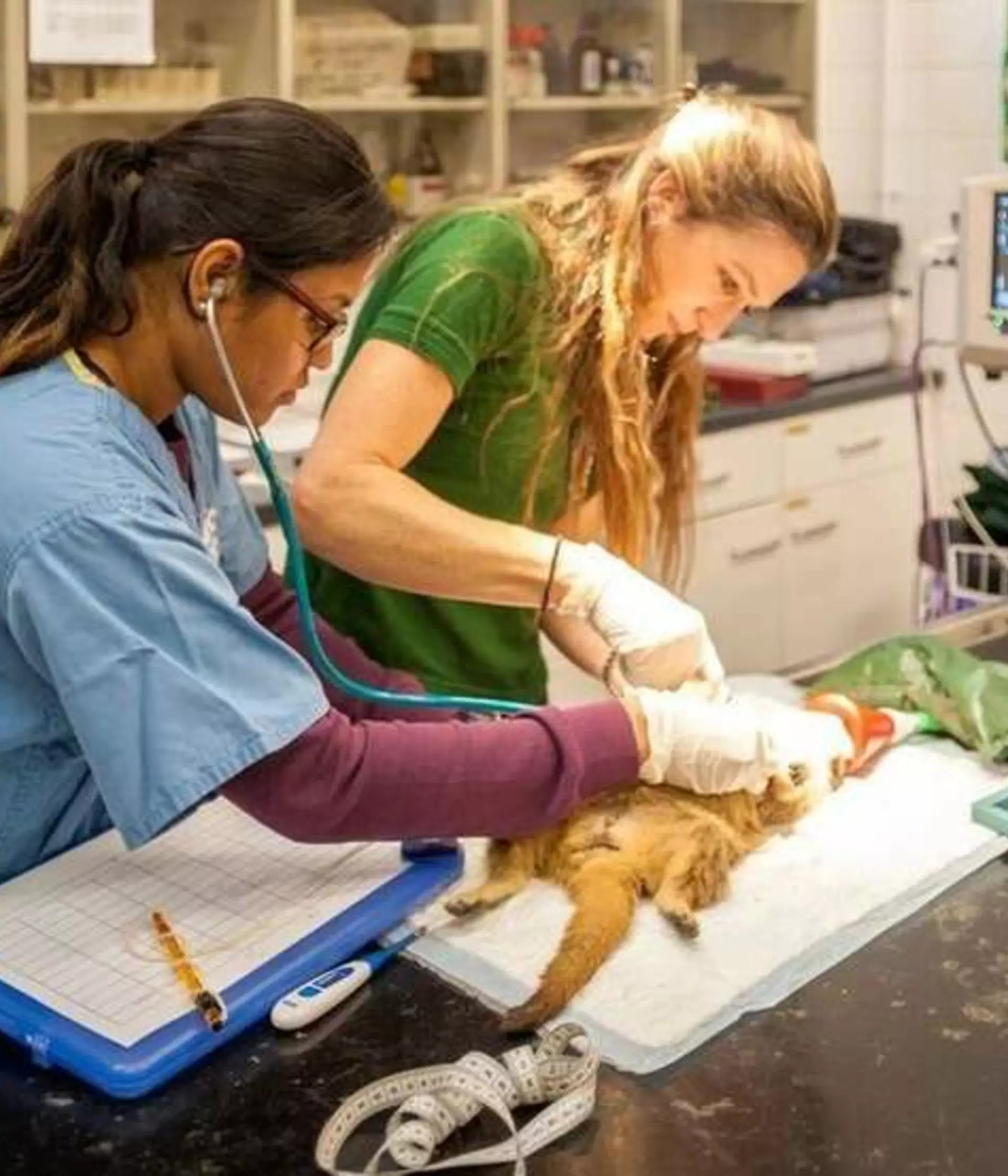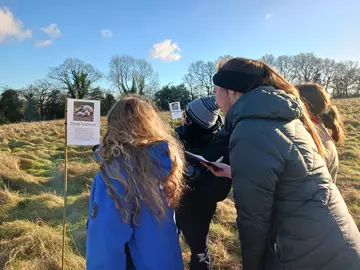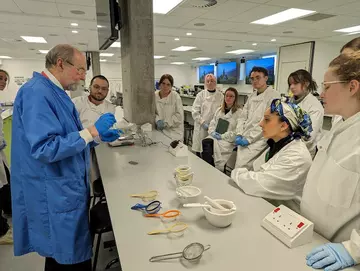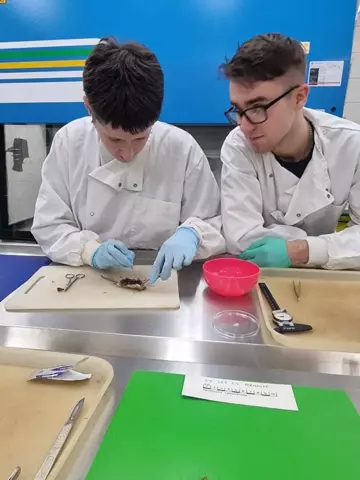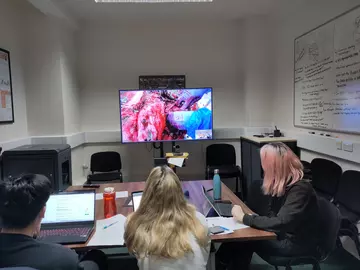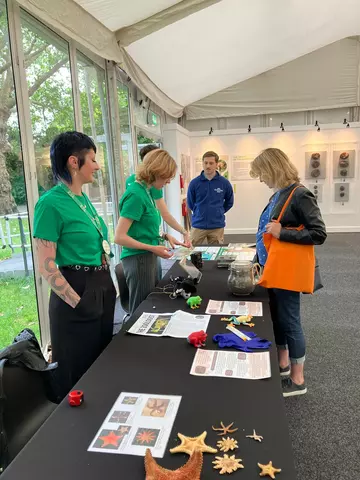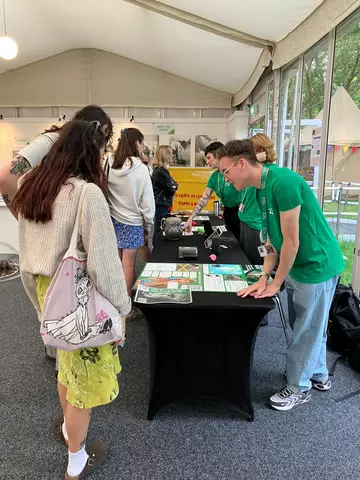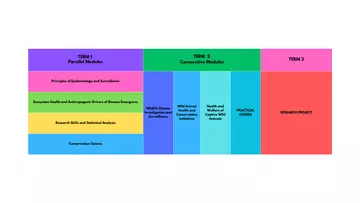
Since its inception in 1994 this world-class specialist Masters course has produced hundreds of graduates, originating from dozens of countries.
It provides qualified veterinarians with a critical understanding of the management of wild animals and the epidemiology, treatment and control of wildlife disease. The course provides practical exposure to wild species in a captive setting and an understanding of their health, welfare and conservation. This masters also provides training in research methods relevant to the study of wildlife in both captive and wild settings.
The Masters in Wild Animal Health is taught jointly by the Royal Veterinary College and the Zoological Society of London. Aimed at qualified veterinarians, the course will equip you with an in-depth knowledge of the management of wild animals and epidemiology, treatment and control of diseases. You will benefit from working and studying alongside biology/zoology graduates taking the MSc in Wild Animal Biology as well as learning from internationally renowned experts in their field.
MSc Wild Animal Health: Course content
This specialist Masters course is completed over one-year full-time study, commencing in the Autumn. The course is delivered through two terms of lectures, seminars, tutorials and problem-based learning, with modular examinations, followed by a research project over the summer months (May-August), prior to final assessment. Teaching covers taxa e.g. mammals, reptiles, birds and the disciplines that influence these taxa, such as epidemiology, infectious diseases, conservation and management. The bulk of teaching takes place at The Zoological Society of London, Regents Park, with time also spent at Whipsnade Zoo and Royal Veterinary College, Camden and Hawkshead Campuses. Both Certificate and Diploma levels of study are available, there are no part-time or distance-learning options available.
The course provides participants with:
- A critical awareness of current problems in wildlife diseases with implications for wildlife conservation and welfare
- A new insight into interventions for the health management of captive and free-living wild animals
- A systematic understanding of the biological principles underpinning wild animal conservation and management, and the epidemiology, diagnosis and control of wildlife disease
- Basic competence in veterinary techniques and preventative medicine for wild animals
- A conceptual and practical understanding of how established techniques of research and enquiry are used to create knowledge in the field of wild animal health
- A comprehensive understanding of scientific skills, including a critical review of the scientific literature, and design and analysis of laboratory or field studies

For a complete list of programme-level intended Learning Outcomes and modules within the course, see our Programme Specifications
We invite applications from candidates with a first or second class honours degree from a recognised veterinary school and at least one year of postgraduate veterinary experience.
We are keen to see evidence of relevant work experience in a zoo, wildlife rehabilitation centre or wildlife hospital.
Graduates of the MSc Wild Animal Health are, unfortunately, not eligible to apply for either of the European College of Zoological Medicine residencies offered by ZSL/RVC (Zoo Health Management or Wildlife Population Health). This position is the result of the way these positions are funded and UK government tax rules.
This course will give you training in why health matters in wild populations, how we can monitor it and how we can influence it. If your interests are solely clinical then check out the hands on Zoo Health Management and Wildlife Populations Health residencies.
English Requirements
If English is not your first language you will need to provide evidence of proficiency in spoken and written English, including scientific usage and comprehension. You will be required to achieve an overall score of 7.0 in IELTS with a minimum of 6.5.
Visit Entry Requirements
Course Directors:
Module Leaders:
Principles of Epidemiology and Surveillance: Dr Julian Drewe
Ecosystem Health: Dr Andrės Valenzuela Sánchez and Prof Andrew Cunningham
Research Skills and Statistical Analysis: Dr David Brodbelt and Dr Ruby Chang
Conservation Science: Dr Marcus Rowcliffe and Louise McRae
Wildlife Disease Investigation and Surveillance: Dr Becki Lawson and Dr Simon Spiro
Wildlife Animal Health and Conservation: Dr Tony Sainsbury and Dr Malcolm Nicoll
Health and Welfare of Captive Wild Animals: Dr Amanda Guthrie and Lewis Rowden
Practical Studies: Dr Taina Strike, Dr Simon Spiro, Dan Simmonds, Hayley Jakeman and Alex Thomas
Research Project: Dr Chris Yesson and Dr María Díez-León
The Graduate School
The Royal Veterinary College
Royal College Street
London NW1 0TU
United Kingdom
Email: admissions@rvc.ac.uk
Tel : +44 (0) 207 468 5147
Our graduates have gone on to work with both captive and free-living wild animals as clinicians, pathologists, epidemiologists, academics and senior management in zoological collections, national parks, universities and government departments worldwide. Others continue to work towards a PhD or DVetMed, either with ZSL, the RVC or at other leading research institutes.
Marcus Clauss
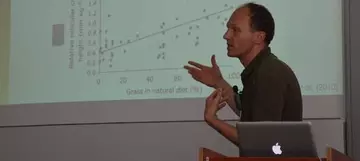
After studying veterinary medicine, Marcus Clauss did the MSc course in Wild Animal Health. The MSc research project on the feeding and digestive physiology of captive giraffe got him into contact with his next employer, the Leibniz Institute for Zoo and Wildlife Research in Berlin, Germany.
His next research was in the field of nondomestic herbivore nutrition, working on moose, black and greater one-horned rhino, hippos and various ruminant species.
He did a 5-year postdoc period at the Institute of Animal Physiology, Physiological Chemistry and Animal Nutrition at the University of Munich, before he found tenure as the Head of Research at the Clinic for Zoo Animals, Exotic Pets and Wildlife at the University of Zurich.
He is actively involved in graduate and postgraduate education (and also teaches on the MSc WAH nowadays), has supervised a large number of MSc and PhD theses, and continued his research in the area of digestive physiology, anatomy and nutrition of various herbivores, omnivores and carnivores; he has since worked on topics from life history, husbandry and zoo management.
Sonika Bengaluru Lakshminarayana

"I'm Sonika Bengaluru Lakshminarayana, a proud graduate of MSc in Wild Animal Health 2023 from RVC. After completing my post-graduation, I had the incredible opportunity to represent both India and the UK at the 55th AAZV annual conference. It was an honour to receive the Murry Fowler International Scholarship award and present my Mater's research project, earning the graduate degree award for my conference presentation. Currently I'm working as a Project Associate Veterinarian for the "Habitat Improvement and Conservation Breeding of Great Indian Bustard (GIB)" project at the Wildlife Institute of India (WII). Being an alumni of RVC and ZSL fills me with gratitude and I'm committed to continuing my journey in wildlife medicine and conservation. Excited to contribute further to this field that I'm passionate about."
Dr Elysé H Summerfield-Smith BSc(Hons)(Int) BVs MSc(WAH) MRCVS
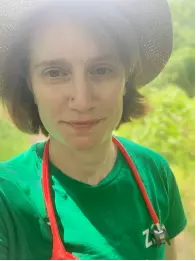
Elysé Summerfield-Smith is from the North-West of England, and started her career as a mixed, predominantly farm animal vet in North Yorkshire, Elysé studied her MSc WAH as part of the 2020-2021 cohort, and after a post in ZSL's Disease Risk Analysis and Health Surveillance (DRAHS) department, is now a clinical veterinary surgeon at Marwell Zoo in Hampshire, Elysé is also the British Veterinary Association Council's Recent Graduate Representative, and in 2022 received the BVA Council Impact Award (Bleby Cup).
Dr Justine Shotton

Justine has been a vet for fifteen years, initially working with farm animals, horses and domestic pets and now working as the Head Vet for Wildlife and Exotics at the RSPCA following eight years as a zoo vet in Hampshire. Justine is passionate about environmental sustainability, conservation and improving the welfare of all animals, both wild and domestic. Justine is a Director of Vet Sustain and a Trustee of the Animal Welfare Foundation. She was President of the British Veterinary Association from 2021-2 and chose Sustainability as her presidential theme, working on a variety of resources to help ensure actionable change to help the veterinary profession become more sustainable. As well as her veterinary degree, Justine has a BSc in Veterinary Pathology and an MSc in Wild Animal Health and she continues to champion One Health and the interplay between human health, animal health and environmental health. In her downtime, Justine loves wildlife photography, travelling, learning Italian, dancing, baking and pretty much every sport she can try!
Dr. Khyne U Mar BVS, MSc, MPhil, PhD, FRVCS
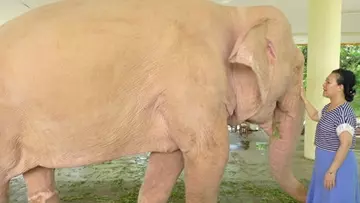
"I have been previously employed by the Myanma Timber Enterprise, Ministry of Forestry as the Head of Elephant Section, Extraction Department.
I attended MSc (Wild Animal Health) Course in 2000. The course gave me the opportunity to pursue PhD programme which reflects my own unique interests in Asian elephant ecology and population demography.
After finishing my PhD in 2007, I worked as the Asian Elephant Consultant in SE Asian countries and in zoological collections in UK. Currently I work in the position of Post-doctoral Research Associate at the Department of Animal and Plant Sciences, University of Sheffield, UK.
I am taking the role of Project Co-ordinator of Myanmar Elephant Research Project. I co-supervise PhD and MSc projects with Dr, Virpi Lummaa (Reader in Evolutionary Biology at the University of Sheffield). I oversee research activities in Myanmar and liaise between International scientists and the Myanmar Government. Our research group aims to determine factors affecting health, fertility and mortality rates in the captive elephants of Myanmar and devising strategies to improve them."
Richard D Suu-ire

"Following my completion of the MSc in Wild Animal Health in 2006, I was appointed as a wildlife veterinary epidemiologist. I actively participated in the control of many diseases including the Avian Influenza outbreak in Ghana in April 2007, and am Unit Head of the Wildlife Surveillance Unit of the European Union Avian Influenza Project in Ghana and a member of the Avian Influenza Ghana National Working Group.
I have worked closely with a range of leading international research institutions and organizations, such as WHO, Center for Disease Control and Prevention (USA), and I am currently collaborating with the Institute of Zoology (ZSL), Animal Health laboratory Agency and the Cambridge University (UK). This collaboration focuses on viral zoonoses of fruit bats; the findings of this have been published in leading international journals and presented at international scientific fora.
I am also a PhD student at the University of Ghana with affiliation with the Institute of zoology. I am the Immediate past president of the Commonwealth Veterinary Association (CVA), and currently the first vice president. The MSc in Wild Animal Health has been very helpful in shaping my career."
Claudio Soto-Azat, MV, MSc, PhD, Universidad Andres Bello, Chile
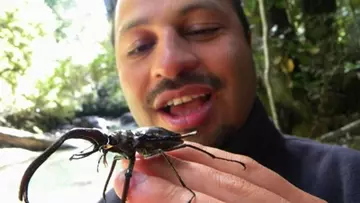
"I have been involved in animal conservation since 2004 when I became veterinary surgeon in Chile. In 2006/7 I followed my MSc studies in Wild Animal Health and since then I have continued being linked with ZSL through my PhD in Conservation Medicine and the EDGE Programme.
The MSc in Wild Animal Health is one of the most important experiences in my life. Professionally, I developed in the areas of wildlife medicine, wildlife population health and conservation, but personally I also made excellent friends from all over the world and I growth as a person. Today, I am academic and researcher at the Faculty of Ecology and Natural Resources, Universidad Andres Bello, Chile, and always I have felt deeply grateful from the MSc programme."
Rea Tschopp, Armauer Hansen Research Institute, Ethiopia and Swiss Tropical Institute
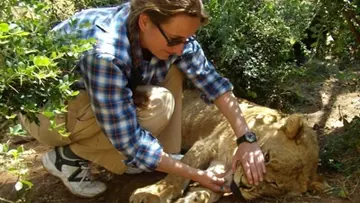
"Following the completion of my MSc in Wild Animal Health in 2003 I worked as a wildlife veterinarian for 2 years before starting a PhD in Epidemiology at the Swiss Tropical and Public Health Institute, investigating Bovine tuberculosis at the human-livestock-wildlife interface in Ethiopia.
I am currently a research team leader in Zoonosis/One-Health where wildlife and ecosystem health play a big role. Besides being a researcher, I also continue to work as a practicing wildlife veterinarian in Ethiopia as well as lecturing wildlife medicine, and epidemiology at several veterinary faculties at under-and postgraduate levels. The MSc program was without doubt the most important stepping stone in my career."
"The Masters in Wild Animal Health was a fantastic introduction into the conservation science arena. The course gave us a firm grounding in the basic tools needed for a role in conservation, with a diverse range of speakers providing lectures in their specialist fields, ranging from statistics and virology through to practical classes on remote capture techniques and cetacean rescue. For those interested in a job in conservation, or who just want to discover more about this rapidly emerging field of science, I would highly recommend this course" - Hugo Richardson
"Pursuing a Masters in Wild Animal Health was a dream come through and one of the best experiences. This course gave me a chance to be lectured and work alongside Veterinarians that wrote the wildlife textbooks that I studied from. It broadened my knowledge on wildlife medicine and management and welfare of wildlife. It also stimulated my interest in conservation and emerging diseases. The practical component was my favourite as we were on rotations at well-established Zoos. It was a great opportunity to network with people from around the world and build a rapport. I am still in contact with my colleagues and contact them when I need a consult. I am sure this masters will help me advance in my career, as I am now the first qualified Wildlife Veterinarian in my home country of Trinidad." - Naveena Baboolal
"The MSc course was a brilliant opportunity to get exposure to a large number of specialists - their knowledge but also their various fascinating characters. The resources of the IoZ and the course modules allowed me to delve into so many topics of zoo animal biology and management that I still profit from today. Most of all, the quest for my own MSc topic, and the planning and performing of the experiments and labwork, were a forming experience that made me feel I can achieve a lot if I just set my energy to it, and the drive and confidence I gained at the time is still with me when I plan new projects today. The MSc course gave my body and soul an arena in which to act out the dreams I had at the time, which laid out - without me knowing - the path to my professional future." - Marcus Clauss
"The special design of this MSc course encouraged me to seek answers by myself and through the discussions with the colleagues who have different academic backgrounds and perspectives. Also, the lecturers are the real experts working on various fields, from animal welfare to veterinary medicine, from captive wildlife management to field research, they equipped me with extensive theoretical knowledge and practical skills in both in-situ conservation and ex-situ wildlife management. The most attractive part of the course was to develop my own research based on my interests. I travelled to Yunnan, China to study the human-elephant conflict issue which was a valuable experience and provided a good starting point for my future career in China." - Michael Hui
"The Masters in Wild Animal Health was a fantastic introduction into the conservation science arena. The course gave us a firm grounding in the basic tools needed for a role in conservation, with a diverse range of speakers providing lectures in their specialist fields, ranging from statistics and virology through to practical classes on remote capture techniques and cetacean rescue. For those interested in a job in conservation, or who just want to discover more about this rapidly emerging field of science, I would highly recommend this course." - Hugo Richardson
"The MSc course in Wild Animal Health was memorable in more ways than one. Personally, it encouraged me to ask critical questions and seek answers, and fit well with my nature to learn by myself. The course gives great emphasis on the diseases and treatment of wildlife from a unique eco-system and conservation medicine perspective, something that is invaluable in today’s changing wildlife conservation scenario. The chance to work with excellent wildlife veterinarians and biologists at one of the premier wildlife conservation societies in the world is also an experience not to be missed. I made great friends and some relationships that will last a lifetime. All in all, this MSc. course brilliantly encapsulates the exceedingly vast field of wildlife and conservation medicine in a short period of one year, and is highly recommended for anyone looking to get into this field." - Sreejith Radhakrishnan, Assistant Forest Veterinary Officer, Periyar Tiger Reserve, India
"The MSc Wild Animal Health not only give me knowledge on wildlife veterinary medicine but also open my mind to the conservation aspect, which is very important currently. It’s been also a great opportunity to learn and work with a famous institution like ZSL, IoZ or RVC. Even now I’m back to work at my home country, I still contact my friends and colleagues over there. This course is one of the best experiences in my life." - Supaphen Sripiboon, Kasetsart University, Thailand
